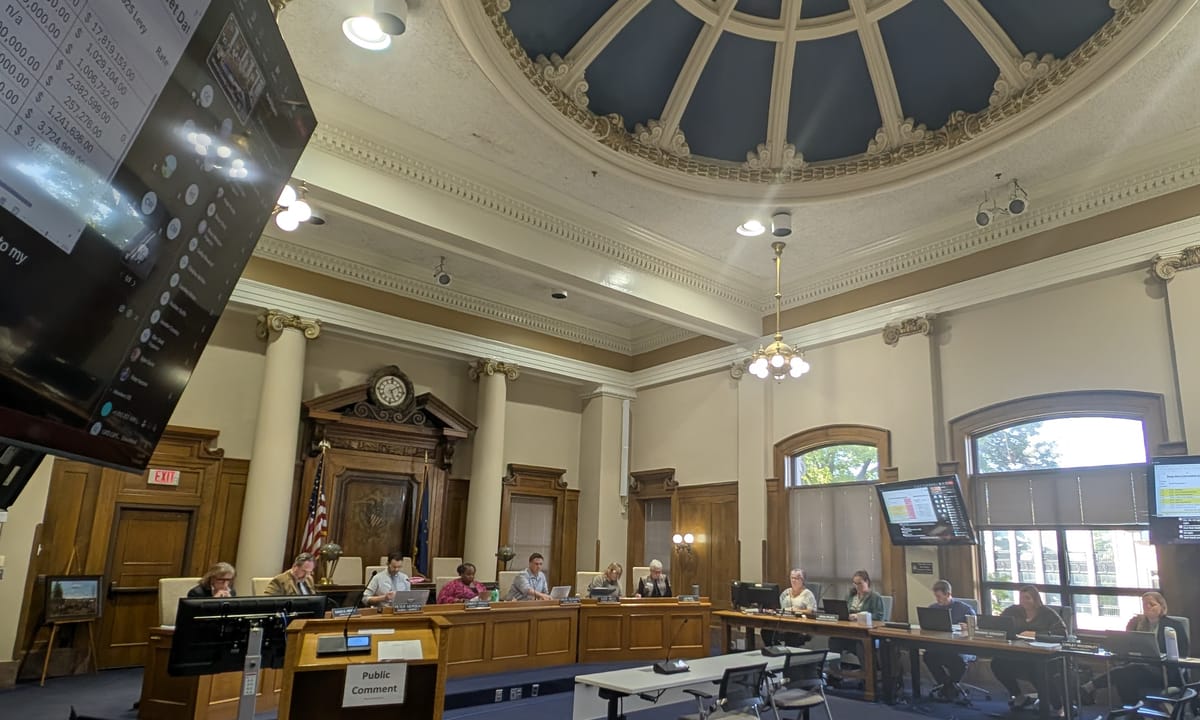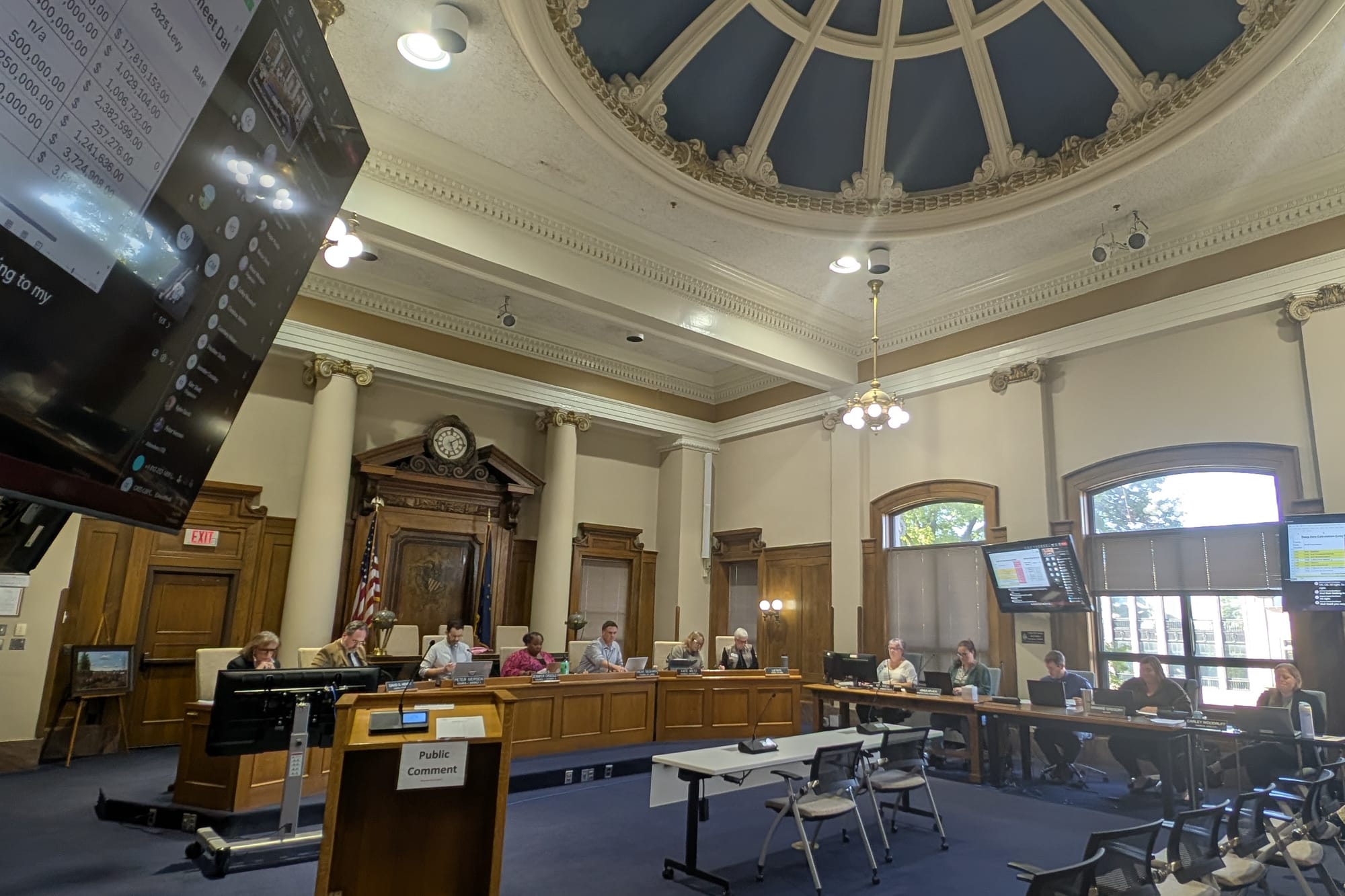Longevity pay for 2026 restored by Monroe County council after pushback from employees
At a special meeting held on Wednesday (Oct. 8), the Monroe County council voted 5–2 to reinstate longevity pay for county employees in 2026, reversing a unanimous decision made just one week earlier, which provoked strong objections from several employees of the county government.


At a special meeting held on Wednesday (Oct.8), the Monroe County council voted 5–2 to reinstate longevity pay for county employees in 2026, reversing a unanimous decision made just one week earlier, which provoked strong objections from several employees of the county government.
Dissenting on Wednesday’s vote were David Henry and Kate Wiltz.
The council’s action followed several turns of commentary from the public mic by county employees and frank self-reflection by councilors.
As a part of Wednesday’s meeting, the council also worked to address the roughly $3.8-million deficit it still faces for 2026 after several rounds of cuts, based on $131.5 million in expenses against $127.7 million in revenue.
To start the night’s work, the restoration of longevity pay was a $341,102 step in the opposite direction, when it came to reducing the deficit.
In the course of the evening, the council made several additional budget cuts and added a couple more exceptions to the hiring freeze that it enacted at last week’s meeting.
But the most significant other moves that the council made involved moving about $4.6 million in expenses out of previously budgeted lines into the economic development local income tax (ED LIT) fund. About $360,000 worth of sheriff’s office personnel items were moved into the jail tax fund.
Whether the moves to the other funds were enough to erase the deficit won’t be clear until the staff in the auditor’s office have done the calculations.
At the end of the meeting, council president Jennifer Crossley said the council had finished the work it had set out to do that night, but there could be more to do next Tuesday (Oct. 14), when the council is scheduled to adopt the 2026 budget.
Longevity pay: What is it?
It’s only employees hired before Nov. 1, 2023 who are eligible for longevity pay. A few years ago, the county council eliminated the extra pay for new employees on the advice of their human resources consultant, which analyzed it as something already factored into the step increases that employees receive.
Here’s the extra pay schedule that is based on longevity:
Council reflection on cutting longevity pay
Crossley opened the night’s discussion by taking responsibility for the process that led to the elimination of longevity pay last week. “I think a good leader assumes responsibility for things when they go well and when they don’t go well.” She continued, “We could have had more discussions related to what we did. And for that, I will assume responsibility, and I will say I am sorry.”
Crossley said the council is working to balance under fiscal constraints imposed by the state legislature, but acknowledged that the process had not included enough input from employees.
Other councilors commented in turn about the unanimous vote they had taken to eliminate longevity pay the previous week.
David Henry underscored the fiscal challenges facing the county, noting the deficit and the need to find budget offsets. He said that “whatever we do at this point has to be offset with other cuts in the budget.” Henry proposed an amendment to the motion to reinstate longevity pay—which provided a budget offset in the same motion.
Henry’s proposed amendment would have made the reinstatement of longevity pay contingent on setting the cost-of-living adjustment (COLA) to zero for 2026, with a mid-year reassessment. The amendment failed with support from just one other councilor, Marty Hawk. That meant the COLA that’s baked into the 2026 budget stayed at 3%.
Peter Iversen supported restoring longevity pay, praising Crossley’s leadership, saying she had shown “not only leadership, but integrity and courage that is rare in a leader.” He also noted the strain on employees from recent changes and said, “I will be joining my colleagues today in voting to reinstate longevity. That way we can take a longer and harder look at this in the coming year.”
Trent Deckard reflected on the emotional toll of the previous week’s decision: “I do believe that my vote was well-intentioned on trying to figure out the problem, but I also recognize what councilor Crossley said very well about the timing of that and the effect on people in here, particularly people that are sitting in this audience.”
Marty Hawk said she regretted supporting the initial cut, citing a lack of fiscal analysis and communication: “We didn’t get the fiscal on it. We didn’t present it early enough on, for people to tell us how it was going to affect them, or anything.” Hawk added, “And our employees didn’t even know we were going to be discussing it or voting on it.”
Kate Wiltz expressed concern about the process, but was not keen to reverse last week’s action: “I think that it’s important for us to be careful about how we roll out changes for folks. And perhaps last week, we were not careful. We were careless. That is something that I regret.” Wiltz added, “I’m the one who put forward the motion, and I’ve talked about this as a tool for several years. To me, it felt like we had had the discussions—and that’s not what it felt like for everyone else, and so I apologize.”
Liz Feitl was also critical of the council’s action a week ago: “I do think that we rushed and that wasn’t fair.” But Feitl cautioned that next year’s fiscal situation will be even worse. She added, “So I think it’s going to be really important to really look at this and a multitude of other things. I think there won’t be anything off the table this year.”
Public mic: Employees
Several employees of county government took turns at the public mic on Wednesday to talk about longevity pay.
Kyle Dugger, a public defender who is marking his 10th year of service with the county, highlighted the economic and operational value of retaining experienced staff. He noted that the tasks that county employees do on a daily basis become easier with experience. Losing those experienced employees who are “experts at what they do,” Dugger said, has costs associated with it.
April Wilson, a deputy prosecutor, who will have logged 10 years with the county next year, gave a concrete example of the disparate impact of cutting longevity pay. Wilson compared her own longevity pay with that of her secretary, who has worked for the county for about 27 years. “Her longevity amount is greater than mine, and it should be. She’s approaching almost three decades. When you cut longevity, you cut from both of us, but hers is greater than mine, so she’s going to take a greater hit for that.”
Wilson pointed out the positive impact of the COLA is greater for higher-paid employees like herself. Compared to her secretary, Wilson said, she gets a great benefit from the COLA than her secretary does. Wilson said, “I want to make sure that those employees have been with us—specifically people like my secretary and other support staff in our office and throughout the county—that their long years of service are honored and that the COLA is appropriately reduced to address that.”
Other public comments ranged from thanks for the council’s willingness to reconsider, to sharp criticism. One 28-year employee told the council: “I hope you overturn it, and the ones that you don’t, and the ones that vote against returning it, shame on you.”
Budget adoption meeting
The county council is set to adopt the 2026 budget on Oct. 14 at a meeting starting at 5 p.m.




Comments ()